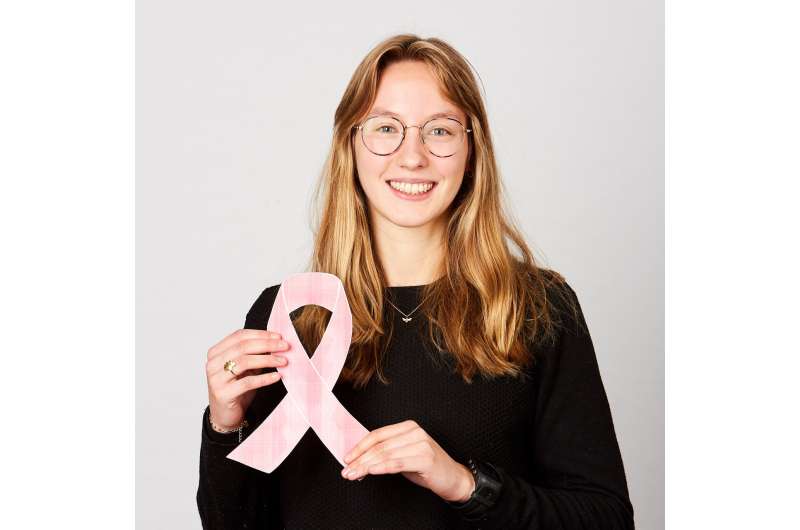
Cancer patients and survivors have better mental and physical health and quality of life if they take part in a physical activity program called “behavioral graded activity” in combination with psychological therapies, according to new research presented at the 13th European Breast Cancer Conference in Barcelona, Spain.
Behavioral graded activity involves physiotherapists helping patients to gradually increase the amount of physical activity they do and to continue to adhere to the program so that, ultimately, the increased activity is integrated into their daily lives. The activities are tailor-made to specific patients and graded over time, with specific goals.
Ms. Astrid Lahousse, from the Vrije Universiteit Brussel and the Research Foundation, Flanders, Brussels, Belgium, told the conference, “For my Ph.D. in physical therapy, I am focusing on pain education and behavioral interventions relating to persistent pain after breast cancer. My goal is to decrease patients’ pain and increase patients’ quality of life by being physically active. Long-term use of pain medication is not appropriate and non-pharmacological treatments are needed.
“We already know that exercise can be beneficial, but some patients do not remain active when their exercise program has finished. Until now, there has been no systematic review of the effects of behavioral graded exercise on different outcomes among cancer patients.”
Ms. Lahousse and colleagues carried out a systematic review and meta-analysis of 33 studies involving 4,330 cancer patients and survivors, comparing the effectiveness of behavioral graded activity and psychological therapies (such as cognitive behavioral therapy and acceptance commitment therapy) with outcomes for patients on waiting lists for treatment, or receiving usual care, or receiving psychological therapies only, or behavioral graded activity only.
They combined the effects of different studies and summarized them in a measurement called a standardized mean difference, or SMD.
They found significant effects for people who had psychological therapy combined with behavioral graded activity compared to those on waiting lists receiving neither. These included large to medium improvements for anxiety, fatigue, depression, ability to manage everyday tasks, psychological distress, physical activity, quality of life, and social impairment. After a period of between one to three months, only the effects on psychological distress remained statistically significant.
When comparing people who had psychological therapies combined with behavioral graded activity with people who received the usual standard of care, the researchers found significant medium improvements for anxiety, depression, fatigue and physical activity. After one to three months, the medium effects on anxiety, depression and fatigue remained significant.
No statistically significant effects were seen when comparing psychological therapies combined with behavioral graded activity with behavioral graded activity only, or psychological therapies only.
Ms. Lahousse said, “When comparing behavioral graded activity with usual care such as leaflets, education and standard recommendations, fatigue, anxiety and depression were reduced, and physical activity increased due to the behavioral intervention. When comparing behavioral-graded activity with no intervention, only psychological problems were reduced in the long term.”
She said the research was important for researchers, doctors, and cancer patients and survivors. “It underlines to researchers that new, non-pharmacological interventions are needed. Doctors need to know about other non-drug related possibilities for care after cancer treatment, and that medication should not be prescribed in the long term. They should consider transferring the care of patients to other appropriate healthcare providers, such as physiotherapists and psychologists. The study also shows patients how they could improve their everyday functioning and quality of life during and after cancer treatment.
“For cancer survivors, it is important to improve non-pharmacological treatments after cancer care. Currently, oncologists are providing the best care during cancer treatment. However, after cancer, patients often feel lost and ill-informed about the side-effects of the treatment. For this reason, more research is needed not only on what should be provided but also on how, because each patient needs personalized care. So, a general, post-cancer program may not be best for everybody. For this reason, behavioral interventions could be more appropriate and should be investigated further.”
The strength of the research is that it is the first to analyze behavioral interventions among cancer patients and survivors, which is a step towards more personalized treatment with patients being able to set their own goals. A limitation is the large variation between the different studies included in the systematic review, which can make it difficult to draw strong conclusions without further research.
President of the European Breast Cancer Council, Professor David Cameron, from the University of Edinburgh Cancer Research Center, U.K., represents the Council at EBCC13 and was not involved with the research. He commented, “How patients and survivors of breast cancer live their lives after their cancer treatment has finished is an important, but often neglected area of investigation. Survivors can live for years if not decades, so support from the health care community is necessary to help them achieve a good quality of life.
Source: Read Full Article
